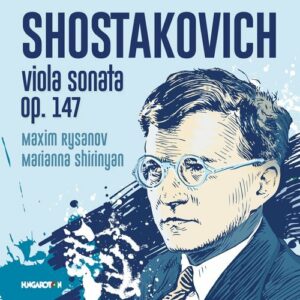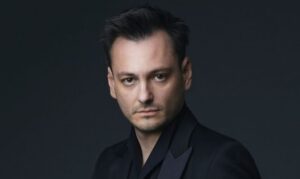Why Shostakovich and why the Viola Sonata?
The Viola Sonata is the composer’s only work for solo viola. It is very personal, written by Shostakovich in the last days of his life. He dedicated it to Fyodor Druzhinin, the violist of the Moscow-based Beethoven Quartet. He remained in close contact with the members of the ensemble throughout his life, dedicating virtually all of his string quartets to them. Next year will be the 50th anniversary of Shostakovich’s death, and I would like to pay tribute to his life’s work with this recording.
 Have you played it much?
Have you played it much?
I first encountered his Viola Sonata when I was 19 or 20. I have performed it many times since, but I must add that it is a very demanding piece, which takes an emotional toll on the performer. Shostakovich was an atheist. He was afraid of death. The pizzicato at the beginning of the sonata seems to be a ticking clock, as if Shostakovich were marking his own time, which was about to run out. Fear and frustration give way to acceptance and farewell.
As you said, Shostakovich’s sonata is a piece of summation and passing. Does the war in Ukraine put this piece in a different context for you?
Shostakovich repeatedly reflected on the horrors of that time, the horrors of the Second World War, and these motifs appear in his chamber works and symphonies. In the case of the Viola Sonata, it’s more personal, and in this respect it doesn’t reflect the images and thoughts I’ve been experiencing during Russia’s war against Ukraine, which has been going on for more than two years.
I was born in eastern Ukraine, in Kramatorsk, into an ethnically Russian-Ukrainian family. My father was from Moscow. I studied in Moscow and made a long list of connections and friends there. Many of them have now left Russia because they couldn’t bear the horror and didn’t want to be a part of it. My former school in Kramatorsk was razed to the ground, and I have heard that two of my former schoolmates were killed at the front. I was a regular visitor to Russia before the war, but much has changed since then and I have to say that decades of friendships and good relations have suffered. My half-brother, who lives in Moscow, went to an antiwar meeting and was brutally beaten up by police.
What can you do as an artist in such a situation?
It’s a difficult question, because I’ve come to realize that the most effective way is to either take up the fight or to help raise the funds for the defense. I know many people who, because of their physical limitations, although they have applied for service, are not able to take part in the actual fighting, so they try to be useful members of the defense society in their homes, with their engineering and IT skills. However some members of my family have joined the Ukrainian army.
At the beginning of the war, I organized a charity concert at the Academy of Music in Budapest, which was joined by a number of my artist friends, and thanks to this we were able to make the suffering of many refugee families more bearable, if only for a short time, through music. This was very important to me and I will always be grateful to those who stood by me. It remains my job, as a performer and conductor, to represent values that are transnational but unquestionable.
When did conducting come into your life?
Over the years I have felt a growing need for a kind of musical care for the whole production. I find that the role of the conductor is still not really clear, even to musicians. I think it’s important to have good technique and to be a good musician first and foremost. The role of a conductor is to drive the production forward, to give precise cues, to inspire and to give meaning to the musical process. For me, these are the most important considerations.
For the full version of the interview click here.























